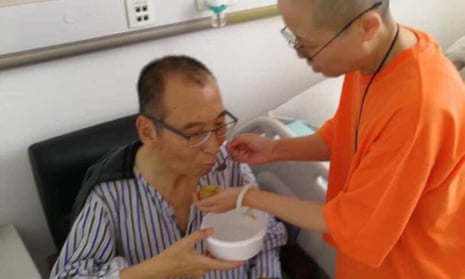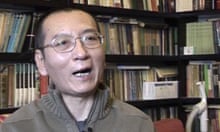Time is running out for China’s most famous political prisoner, Liu Xiaobo, Amnesty International has said, accusing Beijing of showing “new depths of cruelty” with its treatment of the terminally ill democracy campaigner.
Liu, who is 61 and has been behind bars since 2009, was recently diagnosed with late stage liver cancer while serving an 11-year term for subversion.
On Wednesday campaigners repeated calls for Beijing to allow the Nobel peace prize winner to leave the country – a move it has resisted.
“Time is running out for Liu Xiaobo. It is not too late for the authorities to end this cruel farce. They must let Liu Xiaobo and his wife, Liu Xia, travel abroad to get the medical treatment he so desperately needs,” said Salil Shetty, Amnesty International’s secretary general.
“Liu Xiaobo is an inspiring figure whose only crime was to speak truth to power. He should never have spent a single day in jail, an injustice made even more tragic by the fact that his cancer was not diagnosed until it reached terminal phase. President Xi Jinping must do the right thing and order his immediate release.”
Earlier it emerged that China had invited medical experts from the US and Germany to help treat Liu, in an apparent softening of its stance before this week’s G20 summit in Germany.
Liu was jailed in 2009 for “inciting subversion of state power” after he helped write a petition known as “Charter 08” calling for sweeping political reforms.
He was recently moved from jail to a hospital in the north-eastern city of Shenyang. The hospital made the decision at the request of the family and in consultation with the doctors already treating him, the Shenyang Justice Bureau stated on its website.
It provided no other details. Officials who answered the telephone at the hospital said they were unaware of the case.
A source close to Liu’s family said the invitation was a positive step that greatly increased transparency around his illness and the chance that he would receive the best possible treatment available.
“The fact that they specially chose the US and Germany suggests that the authorities are considering allowing Liu to travel to one of these two countries,” the source said, although there were still questions about how the doctors would be chosen and what access they would have.
However, Amnesty attacked the move, which it said appeared in part to be “an attempt to limit international criticism”.
Amnesty’s East Asia director, Nicholas Bequelin, told the Wall Street Journal China had imposed “a near-complete information blackout” around the dissident to limit the reputational damage that came from keeping Nobel laureates in prison.
“As long has having Liu Xiaobo die in China is likely to result in less embarrassment than him dying abroad, the authorities will continue with the same technique,” Bequelin said.
The US embassy in Beijing declined to comment.
The newly appointed US ambassador to China, Terry Branstad, said last week the US would like to see Liu treated elsewhere for his cancer.
The German embassy also declined to comment.
The move comes before Xi’s attendance at a G20 summit in Hamburg, Germany, on Friday and Saturday, where he will seek to project Chinese leadership on issues such as climate change and free trade.
Diplomatic sources in Beijing say China has been nervous that the issue of the Nobel peace prize winner could overshadow Xi’s appearance.
An open letter issued by a coalition of rights groups, including those representing Tibetans and Uighurs, on Wednesday urged G20 leaders to press China for the unconditional release of Liu and grant him freedom to travel wherever he wants.
“Liu Xiaobo’s 2010 Nobel peace prize illuminated the human and political rights of the people under China’s rule, and created a real sense of hope. We urge you not to let that sense of hope fade,” it said.
The government has said Liu is being given the best care possible and that he is being treated by renowned Chinese cancer experts.
However, a growing number of western politicians and international rights activists have expressed concern about the quality of Liu’s treatment and have said he should be given the choice to leave China if that was the best option.
The UN high commissioner for human rights, Zeid Ra’ad al-Hussein, has met Chinese officials regarding Liu, a spokeswoman said on Tuesday.
Chinese authorities told diplomats from Germany, the US and the EU on Friday that Liu could not be moved abroad due to his condition, sources briefed on the matter have told Reuters.
China’s foreign ministry has dismissed concerns from other countries about Liu, at least publicly, saying it was an internal matter for China.









